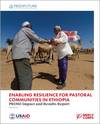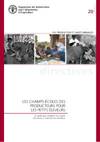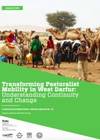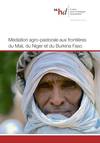Economic challenges, nutritional problems and climate instability are driving many people away from pastoralism in Ethiopia’s drylands. But securing alternative livelihoods requires new technical and life skills. Pastoralist Areas Resilience Improvement and Market Expansion (PRIME) was a USAID-led Feed the Future program that applied a market development and adaptive management approach to help pastoralists strengthen their systems. Therefore, simultaneously addressing economic needs and climate adaptation to increase resilience capacities. By working within pastoralist markets, PRIME helped people to be prepared for environmental shocks by strengthening systems and individual capacities with the underpinning theory that systems working in synergy must be strengthened simultaneously.
Year of publication: 2019Organization: Autores individuales
Topic: Cambio climático, Economía, Resiliencia, Servicios sociales
Language: English
Type of document: Técnico
Geographical coverage: África Oriental
This toolbox was developed within the framework of a pilot project to pilot Participatory Rangeland Management (PRM) in Kenya and Tanzania, managed by RECONCILE (Resource Conflict Institute) through the Rangelands Initiative of the International Land Coalition (ILC). The aim of the project is to test and develop PRM in Kenya and Tanzania with the intention to improve, scale up and mainstream this approach. It is implemented in line with the Voluntary Guidelines on the Responsible Governance of Tenure (VGGT). CELEP is involved in order to contribute to the overall project purpose, which is to attain secure and better use of rangelands (sustainable productivity) by local communities by developing a management model for PRM in Kenya and Tanzania. The toolbox provides a general background on the meaning and modalities of advocacy and proposes exercises to better define advocacy challenges, propose solutions and recommendations, map stakeholders and evaluate advocacy activities in function of their impact and how they contribute to the results.
Year of publication: 2019Organization:
Topic: Tierra, Participación
Language: English
Type of document: Técnico
Geographical coverage: Global
The brief looks at the SDGs most relevant to the pastoral context, and assesses for each of them the main challenges as well as the steps needed to ensure that pastoralism can contribute to achieving the SDGs. These approaches are supported by concrete examples of interventions, provided by various CELEP members. With the right policies and practices in place, pastoralism can be a highly productive and adaptive production system that is resilient to climate change, can support food security through meat and dairy products, and can provide income and employment to dryland communities. In order to achieve the SDGs, it is essential that tailored interventions are in place that support the sustainable development of pastoral areas.
Year of publication: 2019Organization:
Topic: Cambio climático, Economía, Seguridad alimentaria, Tierra, Organización, Participación, Resiliencia, Valeur ajoutée
Language: English
Type of document: Técnico
Geographical coverage: África Oriental
Ce guide a été préparé pour aider les décideurs impliqués dans la formulation de politiques et la planification des programmes à: (i) acquérir des connaissances de base sur l'approche CEP, en mettant l'accent sur la production animale, la santé et la commercialisation; (ii) se renseigner sur la contribution des CEP aux moyens d’existence des communautés tributaires de l'élevage dans divers contextes; (iii) reconnaître les conditions requises pour la mise en œuvre réussie des CEP sur l’élevage; et (iv) comprendre le potentiel de l'approche CEP dans un large éventail de systèmes de production animale et de contextes socio-économiques.
Year of publication: 2019Organization: Organización de las Naciones Unidas para la Alimentación y la Agricultura (FAO)
Topic: Educación, Seguridad alimentaria
Language: Français
Type of document: Técnico
Geographical coverage: Global
Pastoralism is practiced by millions of people worldwide. It has roots in every part of the world and back thousands of years to the beginning of agriculture. But while pastoral societies have existed for millennia, we still don’t know that much about the interlinkages between pastoral practices and the rangelands these depend upon. It’s as if they are invisible in a lot of research about the global environment. There are many questions we cannot answer today with confidence because of widespread gaps in understanding rangelands and pastoralists. Yet, the answers to these questions have profound implications for national and global policy – and influence on how we will deal with climate change.
Year of publication: 2019Organization: Programa de las Naciones Unidas para el Medio Ambiente (UNEP)
Topic: Servicios ambientales, Tierra, Resiliencia
Language: English
Type of document: Técnico
Geographical coverage: Global
Earlier studies have shown that pastoralist mobility offers significant advantages in drylands by enabling herds to access the best-quality grazing over the course of a year. These patterns of mobility face many challenges and are changing. This study focuses on livestock movement in West Darfur, Sudan. It uses GPS tracking to illustrate mobility during the hot dry season and the rainy season. We find that compared with the past, grazing zones are retracting closer to home areas. The report proposes a typology of livestock movements and describes the ways in which herders are responding to challenges related to pasture, water, and conflict and also to livelihood activities. We present provisional recommendations to serve as the basis for further discussion.
Year of publication: 2019Organization:
Topic: Cambio climático, Conflicto, Seguridad alimentaria, Tierra, Resiliencia
Language: English
Type of document: Técnico
Geographical coverage: África Oriental
Dans la région du Sahel, les conflits d’accès aux ressources naturelles opposant communautés nomades et sédentaires ne cessent de se multiplier le long des routes de transhumance. Rapidement instrumentalisés, ces micro-conflits nourrissent l’émergence de conflits armés intercommunautaires qui alimentent à leur tour l’insécurité régionale. Face au risque de militarisation croissante de ces conflits agro-pastoraux dans la région, HD appuie depuis 2015 des réseaux de médiateurs communautaires au profit de la résolution des conflits d’accès aux ressources naturelles.
Year of publication: 2019Organization: Autores individuales
Topic: Conflicto, Tierra
Language: Français
Type of document: Técnico
Geographical coverage: África Occidental
Change is coming to the traditional way of life of Mongolia’s livestock herders. And with it comes additional risks to their economic and food security. The problem is what’s known as a dzud – a summer of very high temperatures and little rainfall followed by the harshest of winters. FAO’s Early Warning Early Action system had started to pick up dzud warning signs in the autumn of 2017. This video showcases describes this approach implemented by FAO to mitigate the impact of the 2017/18 localized dzud on vulnerable herders.
Year of publication: 2018Organization: Organización de las Naciones Unidas para la Alimentación y la Agricultura (FAO)
Topic: Cambio climático, Economía, Seguridad alimentaria, Resiliencia
Language: English
Type of document: Videos
Geographical coverage: Asia Central









